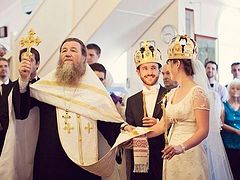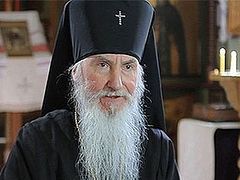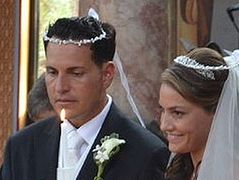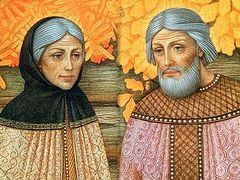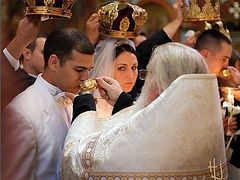
The feminine principle has great meaning in creation. This is manifested on all levels of human existence, both personal and societal. A woman acts in a very special way: she is like a filter that cleanses from evil. Woman’s nature is God’s creation.
In studying God’s world you can see how God has ordered all things wisely. This is even more applicable to mankind itself: in the biological, psychological, and spiritual aspects—in fact from every point of view. It is the same for both man and woman.
It is a great thing to learn to understand your wife—to know how to make her happy, what to do to make her feel content. After all, a woman has her own special sign, and you have to learn it, learn how to listen to and understand your wife. We are talking not about words but about how to understand more than can be said in words—a great number of subtle but important little things.
You need to know well your spouse’s emotional make-up—not this one woman in particular but feminine nature in general, just as it important for the wife to understand the particularities of the male soul. The husband is often unaware that the feminine soul is complex as a labyrinth, and that is why it’s not easy for him at times. It is not easy to find the right way in a labyrinth! It is not easy to catch the unseen and unspoken meaning in what you see and hear.
Women always act differently from men. God Himself made it that way because a woman is a mother. She is distinguished by her subtlety; her emotional make-up is infinitely more complex, because nature has given her that task. The female presence is a different note in nature itself. In entering into marriage you have to fully understand that you are not getting married just to have children. A woman is not a baby-producing machine that is then put on the shelf while you admire the children she brought into the world. This is a mistake that undermines the human relationship between husband and wife.
When the New Testament says that the wife must submit to her husband it does not mean that the wife should become the husband’s slave. It means that the wife should relate to her husband with love, and accept him with her whole soul. The apostle Paul teaches that the wife should submit to her husband, but the husband should love his wife as Christ loves the Church; whoever loves his wife loves himself. The apostle Paul is talking about the particularities of each sex. According to his male nature and make-up, the husband needs the wife to love him, to not reject him, not to doubt in him. This is not because he is sinless but because he needs to hear a kind word, to hear something that will give him the strength to carry on. And if he makes a mistake he needs to be told about it with great kindness and gentleness. In just the same way the woman according to her nature and make-up needs her husband’s love; she needs to feel affection and tenderness from him—that is how she was created according to her feminine nature. The husband must love the wife and treat her tenderly, while the wife must accept him and submit to him with her whole soul—not out of slavery but out of devotion.
Submission in marriage means exceeding the boundaries of your own ego: perfecting yourself by cutting off your own will. You must always act out of love for Christ. We mustn’t see a tyrant or master in a person but God in him: “Blessed is the man who reveres every person as a god, after God.”
The wife: I submit to my spouse out of love for him, as I submit to Christ out of love for Him. My submission is the thread that binds me with Christ and eternal life. In submitting to my spouse I find my freedom, my personality, and the fulfillment of my own self.
The husband is the head of the family as Christ is the head of the Church and Savior of the body of the Church. This does not mean that the husband stands higher than the wife or that the wife is lesser than the husband, but as is written in the book of Genesis: And God created woman from the rib taken from the man (Gen. 2:22). He did this precisely so that the wife would feel that with her husband she is whole. God also did this so that the husband would not say, “She is alien to me, I have nothing to do with her—she is one, and I am another.”
God took a rib from Adam’s side and when Adam saw Eve he said, “This is bone of my bone and flesh of my flesh; she shall be called woman.” That is, she is not alien but mine—she is me! This is where their attraction to each other comes from—after all, two came from one.
“He created woman from his rib, and yoked to him a helpmate.” This yoking is to one yoke. That is, God took the wife and the husband and placed them under the same yoke—the yoke of marriage—so that these two people would bear the cross and burden of their marriage together. This is not a punishment but a path; in stepping upon it is necessary to attain a connection with God. Christ is the Head of the Church, and the work of the Head was to serve His Church, to save it, and not to oppress it. And He saved it by offering Himself as a sacrifice, “crucified and resurrected” for it. So is the husband placed as the head of the wife, in order to protect her, serve her, cherish her; sacrificing himself, and if necessary dying for her and his family. The apostle Paul says that the husband is the head of the wife (Eph. 5:23). And one wise elder adds “Yes, but the wife is the heart of the husband.” Just as a body without a head is not a body, so also without the heart is it dead and cold. If the husband is the head of the wife then the wife is the heart of the husband. That is why the Lord did not created them alike—precisely so that they would complete each other. They are no longer man and woman, but two in one.
Thus, a wife’s submission to her husband means that she receives his sacrifice, protection, and service, his striving to cherish her and if necessary to die for her.
And husbands must love their wives as Christ loves His Church. He did not love it just so that it would serve Him, but in order to enlighten and purify it—to bring us to Himself glorified by His glory, having no sin, vice, or impurity, so that we would be holy and immaculate before Him. Therefore the husband also, like his own body, should love his wife: whoever loves his wife loves his own self.
There is nothing bad about loving and respecting, and not oppressing your wife, because your wife is yourself. Do you love your body, take care of it, give it rest, watch after it and groom it? In the same way you should, as the apostle Paul says, love and protect your wife, take care of her and serve her—for she is not something alien to you, she is your own body, and you yourself.
In marriage the husband and the wife spiritually grow into one, and in this unity there is not nor can be any separation. You cannot separate the soul from the body. Spouses, just like the soul and the body, should be in such communion that they are in no way separate.
When the Church says that the wife should obey her husband and the husband is the head of the wife, it does not mean that the wife is an irrational slave to her husband with no will of her own, but to the contrary, he is talking about agreement between the spouses. For in obedience a person acquires his own great freedom. By submitting yourself voluntarily and consciously to another, you become all-powerful and truly free. Obedience is a great thing! Whoever submits himself out of love for God will understand what life is, what joy is!
Thus, two unite into one and learn this great mystery: so that the wife would support her husband, and the husband his wife. The husband has to know that at home with his wife he will find peace. He needs this according to his nature. And the wife must learn how to be the joy and consolation of her husband.
The wife should feel that the head, that is, her husband, is sensitive and attentive, that he takes care of her, respects and values her. Just as the brain takes care for the body, so the husband must take care of the wife, so that she would not be alone.
All of this is hard for the ordinary human imagination to fathom because it has a different dimension: that of Christ and the Church. When Christ and the Church are placed at the foundation of a marriage relationship, this relationship becomes deeper and is sanctified, an other-worldly perspective opens up in it, which continues on to eternity. Its goal is to lead the husband and wife to Christ, to union with Him.
From The Open Heart of the Church by Metropolitan Athanasius of Limassol, translation from the Greek by A. Volgina and A. Saminskaya (Moscow: Sretensky Monastery, 2014), 180-186.

